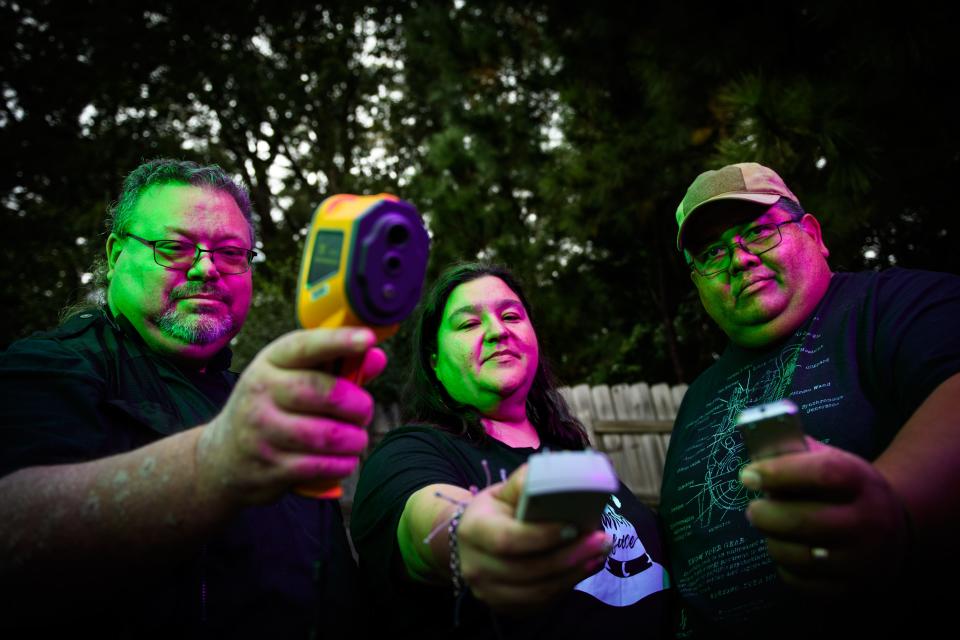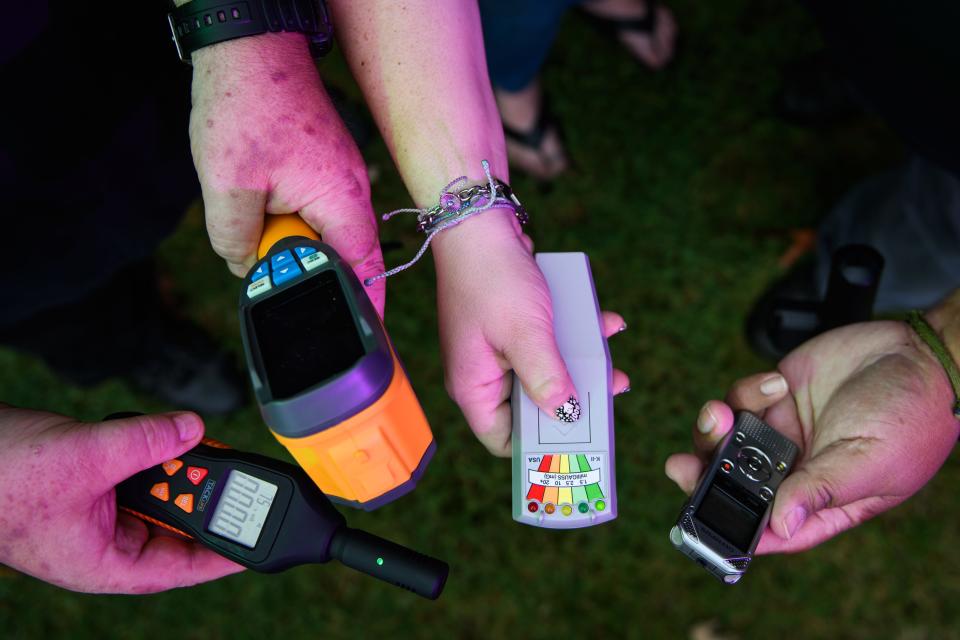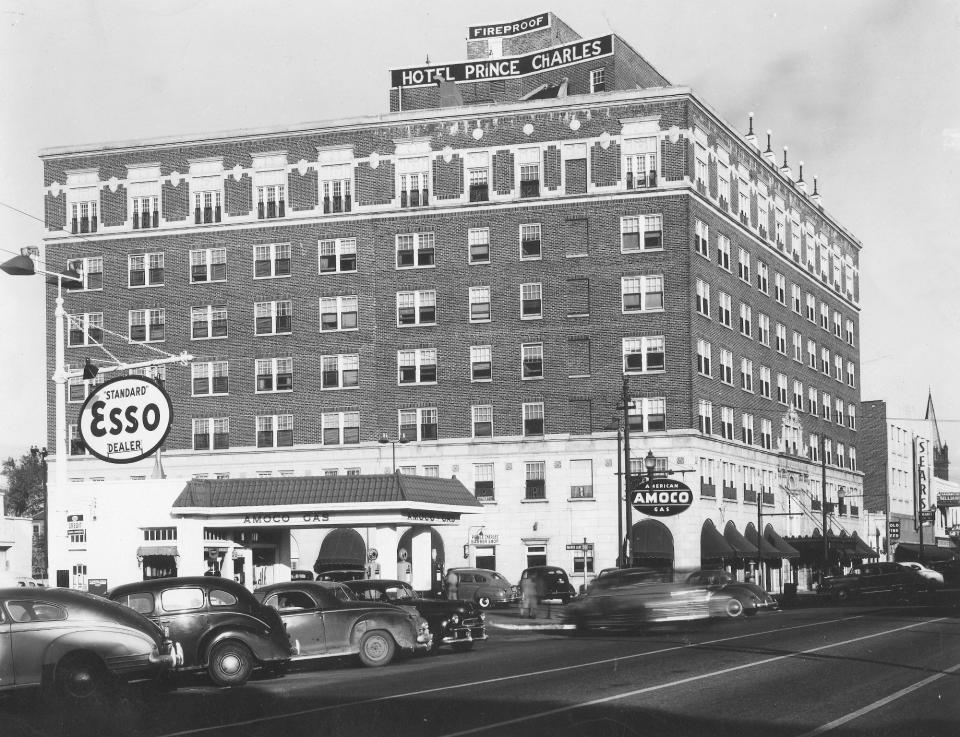'Not Ghostbusters:' What is the Paranormal Research Organization of Fayetteville?
October is a busy time for the Paranormal Research Organization of Fayetteville.
The group has been in the area for more than a decade and includes members Joanna and Armando Nunez of Cumberland County and Tom Kuntz of Harnett County.
While the group tries to use scientific research to debunk claims of hauntings, there have been a few unexplained phenomena that have come up during their investigations.
The Fayetteville Observer spoke to the group last week about who they are, what they research and what their research has produced.
The following responses have been edited for length, style and clarity.

How long have each of you been part of the group, and when did it form?
Kuntz: I’ve been ghost hunting for a long time and met Joanna, and Armando wanted someone to join the group and go out and run with. At that point in, there were three different groups at that point. Groups tend to start up and die out with how people work and where people are. PROOF is probably the longest group I've ever been in, especially in a military town ... I started out in Pennsylvania in 2000, and there was a person up there who was a UFO specialist who kept getting ghost stories that he floated to me.
Joanna Nunez: I started in 2009.
More: 8 famously haunted spots around the Fayetteville region
Are there just three people in the group, and do you require a scientific background to join?
Armando Nunez: We’re the original three.
Joanna Nunez: We’ve got a lot of great people come into the Fayetteville area and met them and interviewed them. As a group, we want to make sure we don’t have any issues or anything that couldn’t negatively come into our investigations. We don’t want disruptive drama. If someone smokes or drinks, they can’t do that at an investigation. We’ve had a college professor, a librarian, a former soldier.
Kuntz: All kinds of backgrounds are helpful. If there’s a place with a creak in the floor, a plumber might know it’s a hot water pipe, or if there’s a stair creak every night at a certain time, a carpenter might know that the sun warms boards up, and they cool at night. My background is in computers.
Armando Nunez: My background is in aviation.
What is the group’s niche focus?
Armando Nunez: We pretty much handle (the) paranormal. Joanna is not much of a fan of anything unidentified or flying. We deal with everything paranormal, from ghosts to poltergeist ghosts. We draw the line on anything nonhuman, depending on the entity inhabiting a certain residence.
Joanna Nunez: The reason why we focus mostly on (the) paranormal is because of the equipment we use, so nothing UFO or cryptical.

What kind of equipment do you use and how do you use it?
Kuntz: Each individual area requires us to set up different equipment, trap cameras or sky cameras.
Joanna Nunez: Ninety percent of what we try is to see if there’s something causing what’s going on, anything from heat to subsonic sounds coming from a device or strange electromagnetic waves coming from a toaster. Electromagnetic fields cause your hair to raise up and make you feel paranoid or like you’re being watched. We’ve been to certain houses that have stray electromagnetic fields, and it usually depends on the age of the home. Some of the older homes we’ve been to we can tell they’ve not been upgraded recently, and the electromagnetic field detector will point to certain conduits emitting too much high energy. It can definitely affect the people living in the home.
How can people reach you if they suspect they have a paranormal case?
Joanna Nunez: We mostly get calls or social media messages, lots of Facebook messages. We used to host a couple of ghost-hunting events at the library, like Ghost Hunting 101 or How to Start Ghost Hunting. Those drew out a specific crowd and people who had stories they wanted us to investigate. We’ve been to a few community areas or battlefields, but most people who want their house investigated find us and reach us.
Armando Nunez: One of our rules is to never go alone. Always have someone else with you. It helps if you’re actually getting evidence to have a second set of eyes so that you’re not the only person seeing what’s going on.
Kuntz: We also don’t want someone to run out trespassing on other people’s properties.
Armando Nunez: There are TikTok challenges to go sit in an empty building for 30 minutes, and that doesn’t make any sense. It’s not safe. Always go in groups.
Since the group formed how many cases have you averaged?
Kuntz: I almost want to say hundreds.
Joanna Nunez: Usually, October is our biggest month, but we tell people if your house is truly haunted, isn’t it haunted the other 11 months a year? Everyone calls in October, but we average about six to eight investigations each quarter.
Kuntz: For each case, it could be 30 hours per person. There’s about six to eight hours of investigation, but there’s pre-investigation work, setting up cameras. There's a lot more work to do afterward to review all the recordings later.
Joanna Nunez: I’m writing a book right now. It doesn’t say specifics about whose houses we go to, so I wouldn’t say Tom’s house, but instead say a brown house in East Fayetteville. I can think of about 12 to 15 good investigations where we’ve been able to spend almost a whole night in a house and set up cameras and our equipment. Of those, probably about half are cases we couldn’t explain. Sometimes there’s too much (sirens), or it’s the neighbors or an animal or something outside … but we’ve had some instances, mostly recordings of electronic voice phenomenon that we can’t explain.
Kuntz: Before we go to a house to investigate someone’s property, we ask questions about them and what’s the origin. We’ve actually turned down some ghost hunts because of noticing drug paraphernalia, or (we) think the medicine they’re on is causing something.
Armando Nunez: That’s where Joanna’s professional trade comes in.
Joanna Nunez: I’m a therapist, but wouldn’t say I’m conducting a full assessment on people … We go into an investigation fully sober with nothing mood-altering. So, if there’s a known history of (the client being under the influence of something like drugs or alcohol) we take that into consideration. Sometimes, we’ve been asked to look at poltergeist phenomena, which can be negative energy, and it could be because a couple is fighting.

What is the name of the book you worked on?
Joanna Nunez: There’s already been the release of one, “Paranormal North Carolina,” which is about the supposed haunted locations in the state such as the Biltmore, Grove Park Inn or Mordecai House in Raleigh. We’ve done some investigations at the Prince Charles Hotel downtown. The book tells each location, the history, what the supposed phenomenon is, and if we investigated. It includes notes of that investigation. It’s been out a month, and I’ve received positive feedback. What I’d like to do next is write a book — and we always give our clients levels of anonymity, we ask them to sign waivers and say, ‘If we get the perfect ghost picture in your house, can we share it on social media?’ And we get some who say OK, but don’t use a name, or it’s OK, but don’t use an address.
8 famously haunted spots around the Fayetteville region
Have there ever been cases where you personally had a feeling, whether it’s uneasiness or something else, that is unexplainable?
Armando Nunez: There was a house in Autryville next to the river. We investigated that place twice. I don’t know about (Kuntz and Joanna), but during one of the investigations I felt an overwhelming feeling of sadness and couldn't explain it, and we ended up getting some electronic voice phenomenon from there. There was a video with a light shadow that we couldn’t explain. I think that house was what affected me the most, but there have been other houses where I think there’s nothing there or don’t feel anything, but we hear stuff (later on recordings).
Kuntz: If someone has personal experiences, we’re trying to back it up with scientific data. So, if they have a personal experience in a certain part of the house, that’s where we usually set up more cameras or sensors. Even though you can’t record a personal feeling, you can record things around it like temperature changes, electronic voice phenomenon or have cameras to back up personal experiences.
Can you elaborate more about what’s been seen on the cameras or heard in recordings?
Joanna: We’ve had a couple of recordings of electronic voice phenomenon, where we didn’t hear anything live in the room when we were there, but went back and heard a voice on the recording or sound that we can attest wasn’t in the room … It would be like recording a conversation right now and going back and hearing a random voice say "yellow" or screaming that none us reacted to …What’s more interesting is when the question “have you ever seen a ghost” is asked of someone, and we go back and hear another voice answer for that person. That’s the stuff we really like to get. We try to make it as scientific as possible. There’s a list of questions we ask developed by the Rhine Research Center. We introduce ourselves and go down a list of questions so that we don’t repeat ourselves. If a good response is found, or something is caught on camera called a light shadow, opposite of a shadow, we try to go back and recreate that with a flashlight or car headlights so that we can say that’s not what caused it.
Investigators look into ghost stories on Army post
What are some misconceptions about the group?
Joanna Nunez: The biggest one is we don’t claim to dispel ghosts, exorcise ghosts or clean a house or rid a house of ghosts. That’s just not our job, and we don’t claim to know how to do that … We’re not “Ghostbusters.” We’ll be happy to come out and find an explanation and tell you what’s going on. Another thing is, we don’t charge. The reason why we decided that upfront is because we don’t want an expectation on ourselves that we have to provide proof of something. If a client gave us $110 and wanted to see a ghost, we can honestly say we were there for six hours and did not find anything. No money was exchanged with the expectation for us to produce something.
Kuntz: Any group worth their weight won’t charge.
Armando Nunez: It’s enough for someone to allow us to set up stuff like a laboratory. If someone allows us to go into their home or business where we can practice paranormal research, that’s great. If someone is asking you to pay for something, a lot of times you get what you pay for.
To reach out to the group, message ProofNCFay on Facebook.
Staff writer Rachael Riley can be reached at rriley@fayobserver.com or 910-486-3528.
This article originally appeared on The Fayetteville Observer: How Fayetteville group researches paranormal activity

